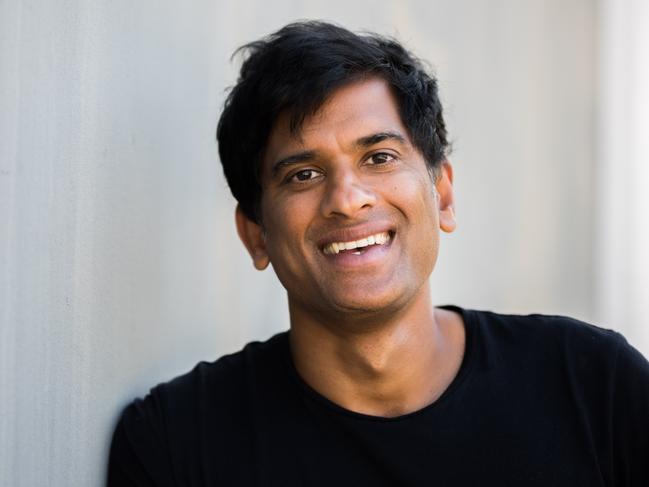Dr Rangan Chatterjee’s men’s health guide: 12 rules for body and mind
The GP, best-selling author and podcast host talks through the changes men can make for a longer, happier life.

If there were ever an anecdote that epitomises Dr Rangan Chatterjee’s approach to health, it comes halfway through our interview. “I always take the stairs over the lift — why outsource our innate ability to move to an electronic device?” he asks, citing a study that recently found regularly opting for the stairs reduces your risk of dying prematurely by 24 per cent.
Small tweaks, always science-backed, that can be easily be worked into a busy life and offer tangible rewards: these are the hallmark of the GP, best-selling author, podcaster and TV presenter. Chatterjee draws on his 23 years’ experience as a doctor when interviewing global health experts for his phenomenally successful podcast, Feel Better, Live More, which has had more than 240 million listens and garnered him 1.4 million Instagram followers. In addition, his sixth book, Make Change That Lasts, has just jumped to the top of the Sunday Times bestseller paperback chart.

“It doesn’t matter where you are in life, you can make changes,” he emphasises when we speak over Zoom. “If you’re worrying you don’t exercise enough, or feeling incredibly stressed, it’s never too late to create new habits that will turn your life around.” Here’s how to start.
Strength training in midlife is critical — five minutes a day will make a difference
Many middle-aged men get into running and cycling (and Lycra) but they would be better off strength training, Chatterjee says. “It’s critical in midlife. Once we hit 30 our muscle mass begins to decrease unless we do something about it, and the amount we have is one of the top predictors of how well we’ll age. It also increases testosterone, an important hormone for muscle function, libido and self-esteem. Chronic stress and sleep deprivation tank testosterone but strength training counters this.”

Every morning while his coffee brews he does a five-minute strength training workout involving squats, press-ups, triceps dips and lunges. Resistance training involves using your own body weight as well as handheld weights. “This works because it’s quick and easy so I never miss it due to being busy and I’ve added it on to an existing habit, which is my morning coffee.”
Don’t tie your self-esteem and identity to your job
Millions of us have absorbed the idea that wealth, status and being constantly busy are measures of a successful life. “It’s no exaggeration to say that this myth is killing us,” Chatterjee says. “When I see patients who are constantly striving to get another promotion, to earn more money, but who have high blood pressure or poor sleep, I get them to ask themselves: ‘What is enough?’
“We think ‘more’ will make us happier and we sacrifice important things, like time with our families or our health, on the altar of work because we want more.” But when you hit your forties and fifties it’s harder to get away with behaviours such as working through the weekend or getting by on no sleep: “Something gives and it’s usually your health.”
To counter this he suggests prioritising sleep and analog activities such as reading, listening to music, doing a crossword or playing board games. He and his wife, Vidh, ring-fence a weekly “slow day” with no plans, with their son, 14, and daughter, 12, at home in Wilmslow, Cheshire.
Lastly, redefine what success looks like. “Everyone has different lives with different pressures so the answer will vary from person to person,” he says. “But for me success is time with family and friends, time to cook and eat properly, time to exercise, time to think, time to be in nature, time to pursue hobbies and passions, and time to rest.”
Don’t be a grumpy old man — it causes chronic stress
“Complaining regularly is bad for your health,” Chatterjee says. First, you generate huge amounts of internal stress, which you then have to neutralise, often through unhealthy behaviours like sugar or alcohol. “Chronic stress is thought to be behind 80 to 90 per cent of what a medical doctor sees in any given day,” he explained in a recent podcast, “because it [negatively] impacts every single organ system in the body. Your brain, your immune system, your gut function, your blood pressure, your blood sugar.”
Second, you risk alienating those around you. Every time you find yourself starting to complain, he recommends pausing to see if you can reframe it as a moment of gratitude (reminding yourself how much worse things could be) or a call to action (doing something proactive to make the situation better). “Choosing gratitude will stop you thinking like a victim,” he says. “Choosing action will stop you acting like one.”
Friendships are more important for men’s health than many realise
Men aged between 30 and 50 suffer the most loneliness, Chatterjee says, “largely because many of us move away from our extended families, work long hours and life gets busy. I’ve always said the old pub culture, where men met in their local most nights, was never just about alcohol but rather companionship.” He encourages men “to take the maintenance of their friendship circles as seriously as their work”.
Tests show that socially isolated rhesus monkeys have significantly increased levels of inflammation, he says. In humans that inflammation makes us vulnerable to cancer, heart disease, diabetes, arthritis, bowel disorders and a host of other conditions.
“My work is going great, I spend plenty of time with my family and look after my health, so in 2025 I’ve decided I don’t need more health goals but friendship goals,” he says. “I’ve started calling old school and university friends for an old-fashioned catch-up, rather than WhatsApping or liking their social media posts, and I’m going to nurture my local friendships in the same way my wife does.”

Psychologists characterise male friendships as “shoulder-to-shoulder” and female friendships as “face-to-face”, he adds. In other words men bond by doing active things together rather than sharing inner thoughts and feelings. “If your partner is a man who has a broken friendship circle I’d urge you to do whatever you can to encourage them to get shoulder-to-shoulder with other men.”
If you really want to tackle the paunch, ditch the UPFs
Diet is a divisive and confusing area, Chatterjee says, but the key principle that “most experts agree on is we should all be eating a minimally processed wholefood diet.” These are foods close to their natural state, such as nuts, plants, meat, fish and beans, that help to regulate our hunger and reduce binge eating.
“Processed foods like crisps and sweets do the opposite because they’re formulated to make us want more,” he says. They also contain many hidden added sugars, which can increase levels of inflammation.
“One tip is to not bring any food into your house that you don’t want to eat. You can’t use your willpower once a food is in your cupboard and I know if I have Pringles in mine, it’s only a matter of time before I stuff my face with them.”
Intermittent fasting can be a game-changer for weight, energy and digestion
If you are carrying excess weight or your blood tests show that you are pre-diabetic, fasting may prove transformative, according to Chatterjee. “Research has shown that it lowers levels of the hormone insulin, which can help us burn fat and increase levels of human growth hormone, which helps maintain our tissues and organs,” he writes. “It can also accelerate cellular repair by removing waste products from our bodies, as well as reduce levels of oxidative stress and inflammation.”
We evolved in an environment of scarcity, during which periods of involuntary fasting would have been inevitable, he says. “I eat within a ten-hour window, between 8am and 6pm. Another time might work for somebody else. When we compress our eating window we see benefits for our weight, appetite, digestion and sleep, and it also cuts out evening snacking. I’m 47 but I feel 32 because of how good eating this way makes me feel.”
Get rid of fitness trackers
“You might assume I’d be a huge fan of health trackers that give us a wealth of personalised data but the current trend for tracking every aspect of our lives, without the necessary knowledge to interpret what we find, is fraught with potential problems,” he says.
Take sleep trackers. After wearing one and having what he thought was a great night’s sleep, Chatterjee woke to find that his tracker had given him a low sleep score, and he soon felt sluggish. “Was I actually tired? Or was the device somehow changing my perception?”
He says some can be helpful if used mindfully, such as continuous glucose monitors that help us understand how our bodies react to certain foods. However, he says that if you are becoming obsessed with the data, or if the trackers negatively affect the way you view yourself, they’re likely to be harming rather than empowering you.
Do something that makes you physically uncomfortable — such as a cold shower or swim — every day
Most of the chronic diseases we are suffering from today, such as type 2 diabetes — a condition that affects an estimated 5.6 million people in the UK — can be directly linked to our reliance on comfort and convenience, Chatterjee says. Not to mention that to feel physically and mentally well we need to know we can rely on ourselves, especially during times of stress.
“Over the years I have seen this play out with my patients,” he writes. “Many of them seemed to have a low-grade anxiety that was built on a foundation of fragility … they didn’t actually trust themselves to be able to handle whatever came their way.”

Don’t beat yourself up. “Humans are hardwired to crave comfort,” he says, but intentionally choosing moments of discomfort “does something very powerful for our sense of self. Examples of embracing discomfort might include turning your shower to cold for the last few minutes, stopping snacking after 7pm, embracing your fear of open-water swimming — which is something I’ve recently done — wrapping up warm and heading out in bad weather, learning something new.”
Creating a simple non-negotiable habit that takes only a few minutes a day but is slightly challenging serves as a signal to your brain that you are capable and in control, creating a ripple effect of positive change in other areas of your life.
Face your mortality — it’s good for you
Psychologists have found a variety of surprising benefits when we regularly reflect on death, Chatterjee says. “Researchers at Eastern Washington University have found that doing so increases gratitude. Another study found that just being physically near a graveyard increases the likelihood that people will help a stranger in need by 40 per cent. Reflecting on death has even been shown to make us physically healthier, driving better choices such as reduced smoking and more exercise.”
He regularly starts the day spending a few moments doing breathing exercises in bed with his eyes closed. “Forget your to-do list,” he writes. “Remind yourself that the day you’re about to start is not guaranteed. Just acknowledging this to yourself can foster a real sense of gratitude and appreciation for life. I personally find this practice really clears the lens.”
One of the best things you can do is to turn off your phone an hour before bed
Turning your smartphone off one hour before bed takes more effort than watching YouTube on it but is likely to improve intimacy with your partner, as well as the quality of your sleep.
“Forty per cent of UK adults aren’t getting enough sleep and here’s the thing: when you don’t get enough, you make poor food choices, you lack motivation to exercise and you’re more reactive to those around you,” Chatterjee says. “I’ve realised that everything in my life is better when I get enough sleep.”
To prioritise this he protects his “wind-down” time every evening. “An hour before bed I turn off my phone and shut down my laptop. I won’t discuss finances or future plans with my wife or watch one more episode of a TV show. Instead I listen to music, have a bath or read a book. That one hour of wind-down gives me ten great hours the following day.”
How to have healthy arguments with your partner
Conflict in relationships leads to a build-up of stress, Chatterjee says, and side-effects such as an over-reliance on sugar and alcohol. When it comes to managing conflict in his own marriage, the best lesson he has learnt is to avoid mind-reading.
“Say your partner hasn’t unloaded the dishwasher. It’s tempting to jump to conclusions and say, ‘You don’t do enough around the house, you don’t appreciate how much I do,’” he says. Instead, wait until you’re calm and stick to the facts. “‘I feel that you always leave the dishwasher to me and this is how it makes me feel.’ By sharing your reality you are much less likely to make the other person defensive.”
Always take the stairs over the lift — it’s good for your heart and mind
To counteract our natural tendency to take the easy option, Chatterjee is a fan of making a list of your “discomfort rules” — such as always taking the stairs — to get you away from constant decision-making, which is mentally draining.

Making lifts and escalators the exception rather than the norm has obvious physical benefits — a meta-analysis presented to the European Society of Cardiology last year revealed that compared with not climbing stairs, stair climbing was linked to a 24 per cent reduced risk of dying prematurely from any cause and a 39 per cent lower risk of cardiovascular disease including heart attack, heart failure and stroke over 14 years.
More broadly, Chatterjee says, regularly putting our bodies through manageable amounts of stress means that when non-exercise stressors come into our life, “we’ll be more ready and able to handle it”.
The Times
Make Change That Lasts by Dr Rangan Chatterjee (Penguin $39.99, available for pre-order).




To join the conversation, please log in. Don't have an account? Register
Join the conversation, you are commenting as Logout